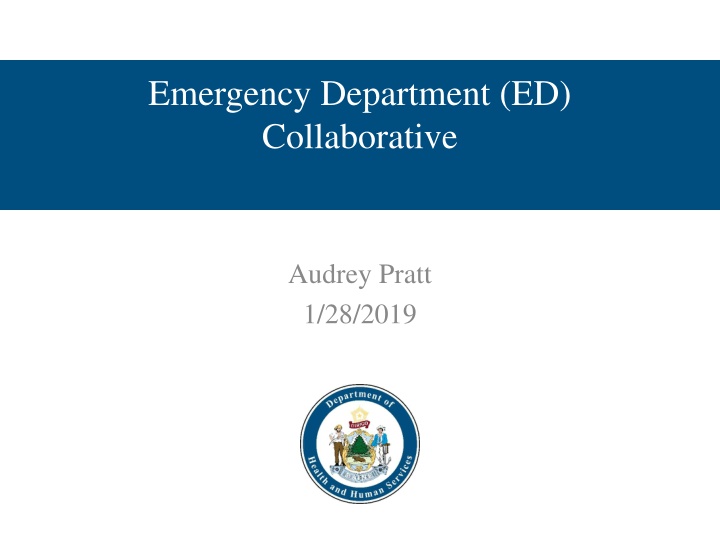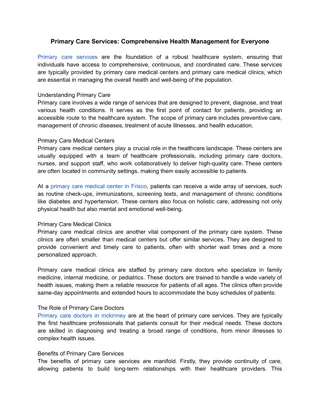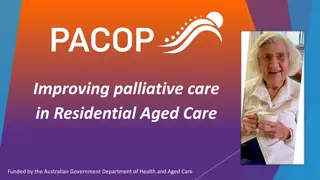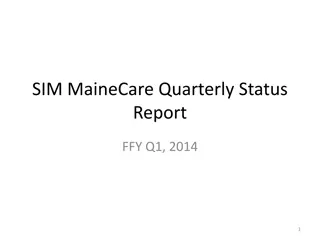MaineCare Collaborative Care Management
MaineCare Collaborative Care Management is a initiative aimed at reducing avoidable emergency department (ED) use through statewide care management efforts, improving health outcomes for high utilizers, and empowering members to engage in their own wellness. The program involves partnering with hospitals, primary care providers, behavioral health specialists, and other healthcare providers to create a consistent plan to avoid duplicating efforts. The care management team consists of nurses, behavioral health specialists, medical care coordinators, a clinical supervisor, and a director. Despite some barriers such as homelessness, substance abuse, and provider challenges, the program is focused on achieving cost savings to reinvest in primary care and other healthcare priorities.
Download Presentation

Please find below an Image/Link to download the presentation.
The content on the website is provided AS IS for your information and personal use only. It may not be sold, licensed, or shared on other websites without obtaining consent from the author.If you encounter any issues during the download, it is possible that the publisher has removed the file from their server.
You are allowed to download the files provided on this website for personal or commercial use, subject to the condition that they are used lawfully. All files are the property of their respective owners.
The content on the website is provided AS IS for your information and personal use only. It may not be sold, licensed, or shared on other websites without obtaining consent from the author.
E N D
Presentation Transcript
Emergency Department (ED) Collaborative Audrey Pratt 1/28/2019
ED Collaborative Background Emergency Departments (ED) are intended for emergency use only, and services performed there can be costly. In 2010, after identifying that some MaineCare members were consistently overutilizing the ED or using the ED inappropriately, the Department implemented the ED Care Collaborative to reduce avoidable and costly trips to the ED. This was also important because a member s primary care or behavioral health provider will have a better understanding of the member s medical history and needs than ED physicians. The program was expanded to involve all hospital EDs in the state by 2014. Maine Department of Health and Human Services 2
ED Collaborative Goals 1. Reduce avoidable ED use and improve health outcomes for high utilizers through statewide care management efforts 2. Provide care management resources through primary care 3. Identify and fill the gaps where no care management capacity exists 4. Increase availability of ED for true emergency situations 5. Achieve savings in order to reinvest in primary care and other priorities 6. Educate providers on implementing program processes 7. Empower and support members to become more engaged in their own wellness Maine Department of Health and Human Services 3
MaineCare Care Management Approach Partner and collaborate with: Hospitals Primary Care Provider (PCP) offices Behavioral Health providers State agencies Community Care Teams Emergency personnel Other statewide providers, to ensure a consistent plan to avoid duplicating efforts Maine Department of Health and Human Services 4
Care Management Team Our care management team consists of: Four nurses Two Behavioral Health Specialists Two Medical Care Coordinators One clinical supervisor One director Maine Department of Health and Human Services 5
Barriers Inability to contact a member Homelessness Behavioral health issues Substance abuse Providers who discharge members No consequence for non-compliance of Individual Service Plan Maine Department of Health and Human Services 6
Care Management Process Step 2: Primary Care Provider (PCP) verification or selection Step 1: Identify member Step 3: Case review Step 4: Partnership with PCP, Behavioral Health, and other health providers Step 5: Member education and problem solving Step 6: Hospital meeting Step 8: Four month follow-up Step 9: Close case Step 7: Care planning Maine Department of Health and Human Services 7
Dental Management Approach Identify members who go to the ED with dental pain or infection Coordinate formal referral, treatment plan, and follow-up care with a dentist Coordinate transportation to the visit Track dental care received Maine Department of Health and Human Services 8
Behavioral Health Management Approach Research claims data for current care management services Work with providers to submit a revised Individual Service Plan that includes ED usage and other goals Educate members on resources available and assist with referrals as needed Coordinate provider and member team meetings to determine goals and plan of care Report all ongoing results to all providers working with the members Maine Department of Health and Human Services 9
Next Steps Concentrate on sub-populations like MaineCare members without a PCP and pregnant members. Partner with Value-Based Purchasing (Behavioral Health Homes, Health Homes, and Opioid Health Homes) to identify members in need of care management services Partner with Change Healthcare for pharmacy management Partner with MaineCare s Case Coordination Unit to manage care for members with complex health needs Maine Department of Health and Human Services 10
Questions? Audrey Pratt, RN Nurse Supervisor Audrey.pratt@maine.gov Maine Department of Health and Human Services 11























